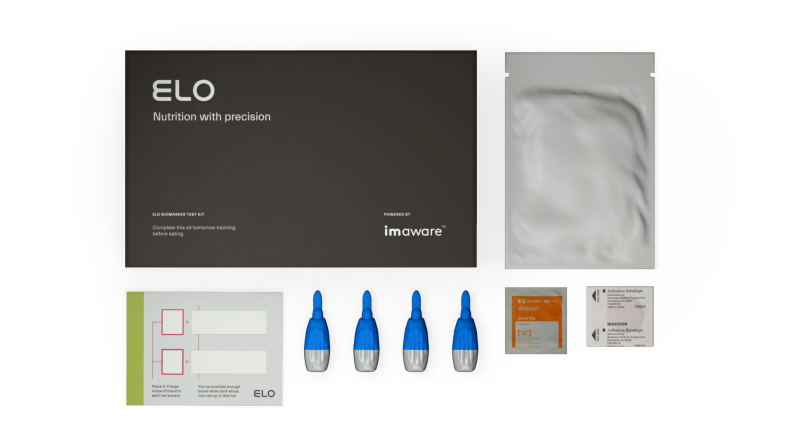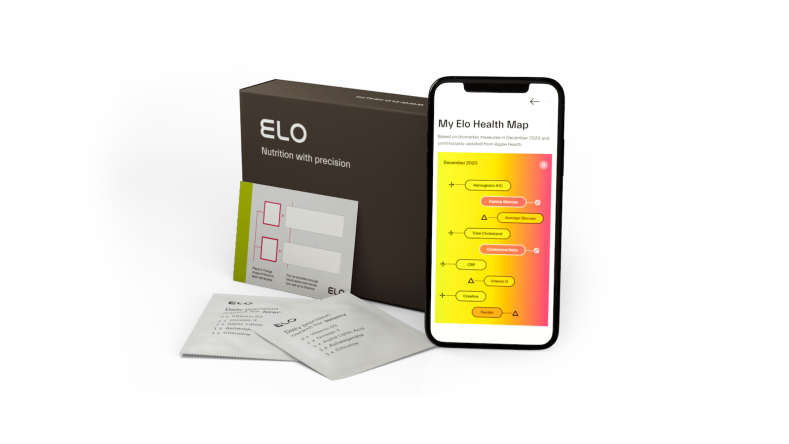What blood biomarkers tell you about your personal nutrition needs
With just the prick of a finger, biomarkers from your blood can help you better understand your current health, disease risk, and nutrition needs. Learn more about what blood biomarkers can tell you about your personal nutrition needs that you may not already know.

Biomarkers provide many important insights into your health and can tell you a lot about your nutritional status. Between uncovering nutrient deficiencies and predicting your risk of disease, blood biomarkers can help you uncover your specific dietary needs so you can more easily optimize your health. These days, it’s getting easier to do since now you can perform biomarker tests at home with a quick finger prick rather than going to the lab for bloodwork.
While blood biomarkers are a useful tool to help optimize your health, there are a few things you should know before trying to interpret your results and make changes to your diet. Let’s start off by getting a better understanding of what biomarkers are and what data is analyzed.
What are biomarkers?
Short for “biological marker”, biomarkers are defined as characteristics of the body that you can measure. Most commonly used to evaluate health and nutrition status, biomarkers include measurements such as pulse and blood pressure, as well as levels of nutrients and other compounds found in the blood [ 1 1 2
Blood biomarkers are useful in several ways, as they can highlight nutritional inadequacies in your diet and help your medical providers assess your risk of certain diseases. This information can provide detailed insights into your health and nutrition and help you improve your diet and lifestyle to optimize wellness and prevent disease [ 2 3

Understand your personal nutrition needs with blood biomarkers
Thanks to the advancement of modern technology, it’s now quick and easy to do biomarker testing at home with just a finger prick. A small sample of blood is all you need to measure critical biomarkers (such as blood cholesterol, triglycerides, blood glucose, and vitamin and mineral levels), all of which will provide detailed information about your health status and how you can improve it [ 4
Learn how you can collect a successful blood biomarker sample at home with
this useful guide
,
Blood biomarker samples measure compounds in the blood that can help assess your vitamin and mineral levels to identify nutritional deficiencies. It can also predict your risk for chronic health conditions with compounds such as cholesterol and blood glucose.
Predicting disease risk
Certain biomarkers (such as LDL and HDL cholesterol, triglycerides, HbA1c, and homocysteine) are indicators of your overall metabolic health and can be used to calculate your risk of disease or diagnose certain conditions, like heart disease or diabetes. Here is what these different biomarkers can tell you about your health.
LDL cholesterol. Also known as “bad” cholesterol, high LDL levels put you at risk for serious health issues, such as heart attack, stroke, and atherosclerosis [
9
]. It’s recommended to have LDL levels be below 100 mg/dL, but lower is better. Learn how you can lower your LDL cholesterol without medicationhere
.HDL cholesterol. HDL is known as the “good” cholesterol, and helps lower your risk of heart disease by recirculating LDL cholesterol back to the liver where it can be removed from the body [
9
]. Higher HDL cholesterol levels are associated with improved cardiovascular health and reduced risk of atherosclerosis, stroke, and heart attack. For both men and women, a HDL level of 60 mg/dL or greater is considered optimal, while a level below 40 mg/dL is considered at-risk for heart disease. Learn how you can increase your HDL levels without medicationhere
.Triglycerides. In combination with high LDL or low HDL, elevated triglycerides is another factor that can increase your risk for heart disease, heart attack, and stroke [
9
]. Studies have shown that high levels of triglycerides (over 150 mg/dL) can also be associated with liver and pancreas problems [10
].HbA1c. Just as with elevated blood glucose, high HbA1c levels are also a sign of diabetes or prediabetes. HbA1C test results are reported as a percentage. Levels in the 5.7-6.5% range are considered prediabetes and a level greater than 6.5% is classified as diabetes [
11
].
Identifying nutrient deficiencies
Even if you don’t have symptoms, having low levels of certain nutrients can negatively affect your health. Here are a few common nutrient deficiencies that can be identified with a simple biomarker test [ 5
Vitamin D: Low vitamin D levels (under 40 ng/mL) can negatively impact your immune system and bone health, and have been associated with increased risk for cancer, cardiovascular disease, diabetes, autoimmune diseases, and depression [
6
]. Learn more aboutimproving your vitamin D levels
through nutrition, supplementation, and sunshine.Iron: Iron deficiency can cause weakness, fatigue, and other mild symptoms (such as headaches and brittle nails). However, research shows that it can lead to other serious conditions such as heart problems, increased infection risk, depression, and pregnancy complications [
7
]. A serum ferritin level below 20 ng/mL is considered low, but can typically be improved through diet and a supplement routine.Vitamin B12: This deficiency is common in people who follow vegan diets, take certain medications (such as antacids or metformin), or have GI conditions like Crohn's or celiac disease that can impede B12 absorption. Low vitamin B12 is considered to be anything under 400 pg/mL, and can lead to serious neurological complications if left untreated [
8
].Homocysteine: This is an amino acid produced when proteins are broken down in the body. High homocysteine may indicate inadequate B12, B6, and/or folic acid intake since all of these nutrients are necessary to metabolize this amino acid [12]. Some studies show that high homocysteine is associated with coronary artery disease, heart attacks, stroke, dementia, and Alzheimer’s disease [13].

How to use blood biomarkers to optimize your health
If you’re wondering how to analyze blood biomarker results to better optimize your health, you’re in the right place. At Elo Health, we make sense of the nutrition science and your personal health data to recommend the right nutrition and supplements for you. We do this with a concept called smart nutrition, which overlays your blood biomarker results, wearable data, and questionnaire answers with a proprietary analysis of over 3,500 clinical trials to best determine your personal nutrition needs.
Once we receive your blood biomarker results from the lab, your dedicated Elo Nutritionist will contact you via email to schedule a 30-minute, 1:1 coaching session. During this session, your coach will review all of your data (including your biomarker results) and make recommendations regarding your precision supplement packet.
The ingredients in your custom supplement packets will be chosen for you based on your unique profile and the dosages calibrated to your goals and needs. Our supplements undergo rigorous third-party testing
Each month, you will receive 30 precision supplement packets that contain your custom supplement mix, as well as daily reminders to take your supplements. Additionally, we include quarterly blood testing and regular check-ins with your Elo Nutritionist to recalibrate your nutrition plan as your goals and needs change.
Summary
Blood biomarkers provide a detailed insight into your overall health. A simple finger prick can identify common nutrient deficiencies and predict your risk for certain chronic diseases, which is especially helpful when determining your nutrition needs. From there, experts can analyze your blood biomarker results to provide science-based recommendations based on your unique needs.
Disclaimer: The text, images, videos, and other media on this page are provided for informational purposes only and are not intended to treat, diagnose or replace personalized medical care.
Key Takeaways
Biomarkers are most commonly used to evaluate health and nutrition status using measurements such as pulse and blood pressure. However, they can also encompass levels of nutrients and other compounds found in the blood [
1
]. This is especially important when analyzing nutrition status and personal nutritional needs.Certain biomarkers (such as LDL, HDL, triglycerides, blood glucose, and HbA1c) are indicators of your overall metabolic health, as they are used to calculate your risk of disease and diagnose certain conditions,
Even if you don’t have symptoms, having low levels of certain nutrients (such as vitamin D, vitamin B12, and iron) can negatively affect your health.
Elo Health overlays your blood biomarker results, wearable data, and questionnaire answers with a proprietary analysis of over 3,500 clinical trials to best determine your individual nutrition needs and create your personalized supplement packet.
References
Strimbu, K., & Tavel, J. A. (2010). What are biomarkers?. Current opinion in HIV and AIDS, 5(6), 463–466.
https://doi.org/10.1097/COH.0b013e32833ed177
Picó, C., Serra, F., Rodríguez, A. M., Keijer, J., & Palou, A. (2019). Biomarkers of Nutrition and Health: New Tools for New Approaches. Nutrients, 11(5), 1092.
https://doi.org/10.3390/nu11051092
Hedrick, V.E., Dietrich, A.M., Estabrooks, P.A. et al. Dietary biomarkers: advances, limitations and future directions. Nutr J 11, 109 (2012).
https://doi.org/10.1186/1475-2891-11-109
Combs, G. F., Jr, Trumbo, P. R., McKinley, M. C., Milner, J., Studenski, S., Kimura, T., Watkins, S. M., & Raiten, D. J. (2013). Biomarkers in nutrition: new frontiers in research and application. Annals of the New York Academy of Sciences, 1278(1), 1–10.
https://doi.org/10.1111/nyas.12069
Pfeiffer, C. M., Sternberg, M. R., Schleicher, R. L., Haynes, B. M., Rybak, M. E., & Pirkle, J. L. (2013). The CDC's Second National Report on Biochemical Indicators of Diet and Nutrition in the U.S. Population is a valuable tool for researchers and policy makers. The Journal of nutrition, 143(6), 938S–47S.
https://doi.org/10.3945/jn.112.172858
Sizar O, Khare S, Goyal A, et al. Vitamin D Deficiency.(2021) In: StatPearls [Internet]. Treasure Island (FL): StatPearls Publishing
https://www.ncbi.nlm.nih.gov/books/NBK532266/
U.S. Department of Health and Human Services. (n.d.). Iron-deficiency anemia. National Heart Lung and Blood Institute. Retrieved October 19, 2021, from
https://www.nhlbi.nih.gov/health-topics/iron-deficiency-anemia
.Means R. T., et al. Clinical manifestations and diagnosis of vitamin B12 and folate deficiency.
https://www.uptodate.com/contents/search
.Grundy, S. M., Stone, N. J., Bailey, A. L., Beam, C., Birtcher, K. K., Blumenthal, R. S., Braun, L. T., de Ferranti, S., Faiella-Tommasino, J., Forman, D. E., Goldberg, R., Heidenreich, P. A., Hlatky, M. A., Jones, D. W., Lloyd-Jones, D., Lopez-Pajares, N., Ndumele, C. E., Orringer, C. E., Peralta, C. A., … Yeboah, J. (2019). 2018 AHA/ACC/AACVPR/AAPA/ABC/ACPM/ADA/AGS/APHA/ASPC/NLA/PCNA guideline on the management of blood cholesterol: A report of the American College of Cardiology/American Heart Association Task Force on Clinical Practice Guidelines. Circulation, 139(25).
https://doi.org/10.1161/cir.0000000000000625
Kota, S. K., Kota, S. K., Jammula, S., Krishna, S. V., & Modi, K. D. (2012). Hypertriglyceridemia-induced recurrent acute pancreatitis: A case-based review. Indian journal of endocrinology and metabolism, 16(1), 141–143.
https://doi.org/10.4103/2230-8210.91211
Understanding A1C. Understanding A1C | ADA. (n.d.). Retrieved October 22, 2021, from
https://www.diabetes.org/a1c
.Homocysteine: Levels, tests, high homocysteine levels. Cleveland Clinic. (n.d.). Retrieved November 1, 2021, from https://my.clevelandclinic.org/health/articles/21527-homocysteine.
Kumar, A., Palfrey, H. A., Pathak, R., Kadowitz, P. J., Gettys, T. W., & Murthy, S. N. (2017). The metabolism and significance of homocysteine in nutrition and health. Nutrition & metabolism, 14, 78.
https://doi.org/10.1186/s12986-017-0233-z

